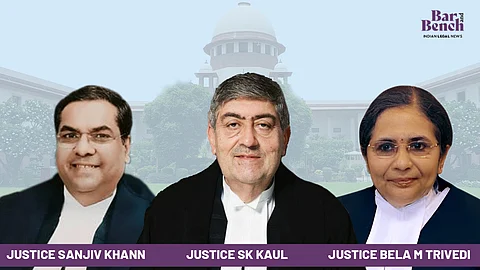
- Latest Legal News
- News
- Dealstreet
- Viewpoint
- Columns
- Interviews
- Law School
- Legal Jobs
- हिंदी
- ಕನ್ನಡ

The Supreme Court has constituted a three-judge bench comprising Justices Sanjay Kishan Kaul, Sanjiv Khanna and Bela M Trivedi to hear review petitions against the July 2022 judgment of the apex court upholding the validity of the provisions of the Prevention of Money Laundering Act (PMLA).
The bench will hear the matter from October 18.
This was revealed on Tuesday by a bench of Justices Sanjay Kishan Kaul and Sudhansdhu Dhulia while adjourning the case relating to summons issued by the Enforcement Directorate to Bharat Rashtra Samithi leader K Kavitha.
In November 2017, a bench of Justices Rohinton Nariman and Sanjay Kishan Kaul had struck down Section 45(1) of the PMLA to the extent it imposed two additional conditions for grant of bail to money laundering accused.
The apex court had then set out various illustrations to explain how the twin conditions were manifestly arbitrary and discriminatory.
However, this decision was overruled in July 2022 by a bench of Justices AM Khanwilkar, Dinesh Maheshwari and CT Ravikumar in the case of Vijay Madanlal Choudhary vs. Union of India.
In that ruling, the Court upheld the validity of several other provisions of the Act including Sections 3 (definition of money laundering), 5 (attachment of property), 8(4) [taking possession of attached property), 17 (search and seizure), 18 (search of persons), 19 (powers of arrest), 24 (reverse burden of proof), 44 (offences triable by special court), 45 (offences being cognizable and non-bailable and twin conditions for grant of bail by court) and 50 (statements made to ED officials).
The Supreme Court also held that the supply of Enforcement Case Information Report (ECIR) under PMLA proceedings is not mandatory since ECIR is an internal document and cannot be equated to a First Information Report (FIR).
Further, it rejected the argument about proportionality of punishment under PMLA act with respect to scheduled offences as wholly "unfounded".
The 2022 ruling has invited criticism and led to several review applications being filed.
Retired Supreme Court judge Justice Rohinton Fali Nariman had in March termed the decision very unfortunate.
Former Chief Justice of India (CJI) UU Lalit had in November last year, endorsed the same view and opined that in Indian criminal jurisprudence, the principle is not guilty, until proven to be guilty.
The Supreme Court in August last year, issued notice to the Central government in review plea filed by Congress leader Karti Chidambaram challenging the Vijay Madanlal ruling.
In March, this year, a bench led by Justice Kaul also sought the response of the Central government and the Enforcement Directorate (ED) on a plea challenging the validity of Sections 50 and 63 of the PMLA.
Section 50 of the PMLA deals with powers regarding summons, production of documents and giving evidence etc.
Section 63 deals with punishment for furnishing false information or for failure to provide information.